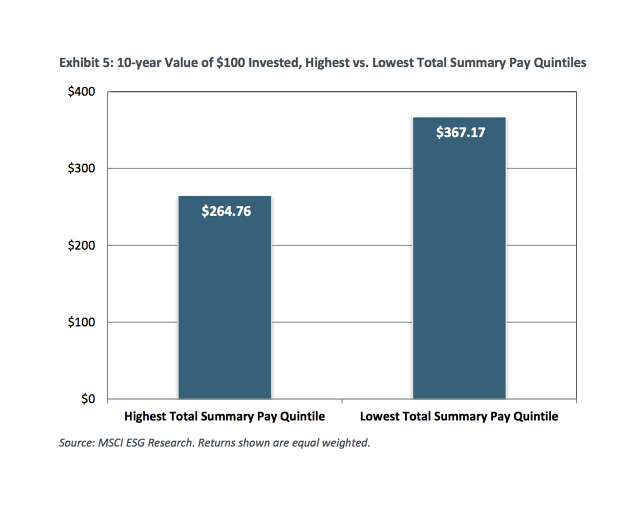Whatever you think about the level of CEO pay (most Americans think they get too much), you might expect compensation levels to at least match corporate performance. But, according to new research, the exact opposite is true. The best-paid CEOs tend to run the worst-performing companies, and the worst-paid are at the top of the best-performing companies.
MSCI, a corporate governance research group, analyzed the pay of 800 CEOs at 429 publicly traded U.S. companies over a 10-year period up to 2014. It included both base pay and stock option payouts. Then it looked at total shareholder returns over that time, including stock price growth and dividends.

If you invested $100 in the companies run by the best-paid 20% of CEOs, you would have seen a total return of $265. If you had invested $100 in the companies run by the worst-paid 20% of CEOs, you would have got back $367.
Thirty years ago, shareholders and corporate governance activists started calling for a change in how CEOs are compensated. Instead of paying CEOs primarily through their salary, they argued in favor of a higher proportion coming from stock options. This would end the “principal–agent problem” whereby CEOs had no incentive to raise share prices (because they were being paid the same whatever happened).
The reform clearly hasn’t worked as hoped, according to MSCI. “Equity incentive awards now comprise 70% or more of total summary CEO pay in the United States, based on our calculations,” it says. “Yet we found little evidence to show a link between the large proportion of pay that such awards represent and long-term company stock performance.”
MSCI says short-termism could be partly to blame: CEO pay tends to be assessed based on annual performance, rather than the whole tenure of that person. If a longer period was taken into account, there might be more alignment between remuneration levels and long-term stock performance, the report argues.
Have something to say about this article? You can email us and let us know. If it’s interesting and thoughtful, we may publish your response.
Fast Company , Read Full Story
(20)